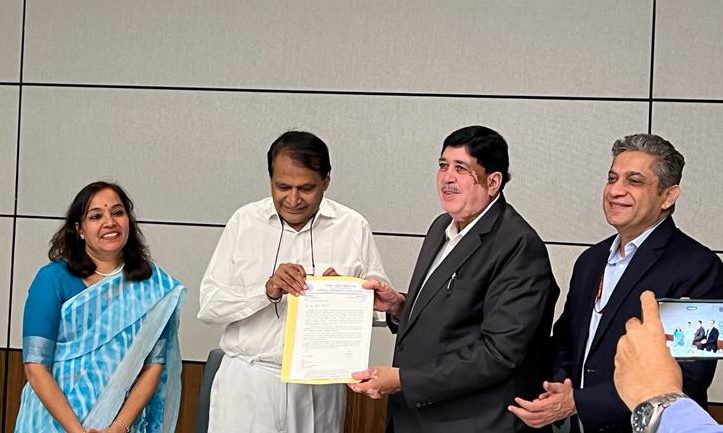During the meeting of conveners of the eight-sub committees formed from the National Cooperative Policy panel, Dileep Sanghani who’s the convener of one of the committees submitted his draft on the respective theme to NCP Panel Chairman and former Union Minister Suresh Prabhu.
The Theme-1 of the cooperative policy & group is ‘Introduction’. The conveners include NCUI President Dileepbhai Sanghani, National Federation of Cooperative Sugar Factories MD Prakash Naiknavare and other members are Dr Y Dongre, GCMMF MD R S Sodhi, Dr H K Mishra and Kribhco MD Rajan Chowdhury.
We are reproducing the draft submitted by Dileep Sanghani below for your perusal. :
PREAMBLE
New National Cooperation Policy Proposes To Envisage:
Promotion Of Voluntary Formation
Autonomous Functioning
Democratic Control
Transparency
Professional Management
Creating Competitive And Vibrant Cooperative Entities
Genesis Of Cooperative
Genesis
Movement formally launched by Cooperative Society Acts of 1904 and 2012
Enshrined are Cooperative Principles and Values
Over a period of more than 100 years, with 8.5 lakh cooperatives and 29 crore members, it emerged as the largest movement in the world.
Membership consists mostly of small and marginal farmers, landless labourers, weaker sections of the community, weavers, fisherman, women
folk and so on.
Covers 98% of the villages with a 3 tier system.
Played a pivotal role in ushering in green and white revolutions.
Substantial growth in diverse areas like agriculture credit, Sugar production, fertilizer production and distribution, procurement of foodgrains.
Diversified its activities and entered into new areas like housing, education, healthcare, insurance etc.
Helped in reducing concentration of economic power, poverty alleviation, food security, income and employment opportunities, corrected regional imbalances and evolving policies to associate youth.
Ensured societal growth, women empowerment and so on.
Previous Policies
Legal, policy & administration framework setup at centre and states.
Cooperation included as a part of planned development.
Funding institutions setup at centre and states.
Banking structure both in rural and urban areas was positioned.
Training, education, skill development given primacy, established institutions all over the country.
Sectoral and commodity cooperatives at State and National level setup.
Cooperatives proliferated into healthcare by setting up hospitals, medical colleges.
The Ayushman Bharat Scheme was launched for cooperatives.
March of Cooperatives Since The Formation Of New Ministry Of Cooperation
Many initiatives taken:
National Cooperation Policy on the anvil.
Impetus to reformulation of legal, policy and institutional framework.
Amendment of Multi State Cooperative Societies Act 2002 (Bill introduced in Lok Sabha)
Primacy to Cooperatives in economic development.
Model Act for States
New schemes for training, education and skill development
Cooperative University
Promotion of large cooperatives for reaping the benefits of economies of scale.
PACS into multi- purpose cooperatives
ITC, computerisation/ digitalisation, technology induction and innovation.
GEM Portal
Increasing share of rural credit and capital infusion
Steps for professionalization of management
Role of Cooperatives in Future Growth, Vision, Mission, Goals/Roadmap, Concept of Sahakar Se Samriddhi
Cooperatives as a true people based movement in economic and social
development in the country.
Active partner in achieving the goal of $5 trillian economy
Doubling the income of the farmers.
Coordination/ Networking with all stakeholders, Central Departments,
States/ UT Administrations, Federations to have collaborative approach
and ensure level playing field to realise the objective of Sahakar Se
Samriddhi.
Goals will include :
Computerisation of PACS/ other cooperatives
Cooperative Education, Training and skill development schemes
National Cooperative Data Bank
Deepening the movement through policy interventions
Technology interventions/ Upgradation
Strategic alliances/ linkages
Professionalisation of management
All inclusive policy for increased participation of women, youth, OBC/ST/SC, artisans, workers, fisherman, rural and urban poor
Consideration of suggestions of Sectoral National Federations
Special attention to be paid for women cooperatives
Organise them to undertake economic activities
Access to financial resources
Cooperative Education, awareness of cooperative model, capacity and leadership development
Advocacy for appropriate laws, policies, schemes/ programmes to promote entrepreneurship
Link them with the G-20 process in a holistic manner.
Guiding Principle and Dimensions of Cooperation Policy
Existing policy still remains relevant
Focus on strengthening the autonomy are independence of cooperatives
Recognition of Cooperatives as a distinct entity
Equal treatment/ level playing field
Large share in National Economy
Conducive legal policy and institutional framework
Education, training and skill development
Diversification
Strategic Partnership
Adequate financial support
Improved working conditions, career progression
Reduction in regional imbalances
Fiscal support in growth
Provision for including other activities like housing, healthcare,
education etc.
Need for New Cooperative Policy
Existing Policy in 2002 needs a relook due to :
Significant change in world scenario
Realization of vision-Sahkar se Samriddhi
Efficient technology driven governance
Enhancing business performance
Strengthening of primary societies
Sahakar Se Samriddhi
Cooperatives need to be geared up
New initiatives and schemes
Aim is to improve socio- economic condition of farmers/ weaker sections
Diversification in new areas
Increasing active membership
New technologies/ innovation to increase agricultural production
Mopping up of production to the best advantage of growers and producers
Capital infusion
New Start-ups
Augmentation of role of sectoral federations
Social security measures
